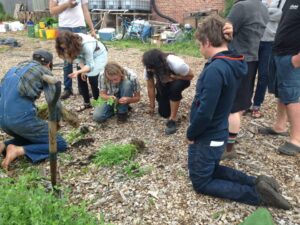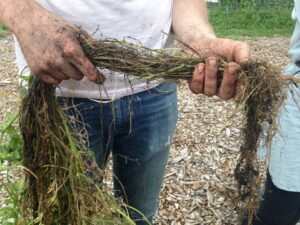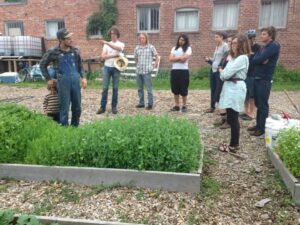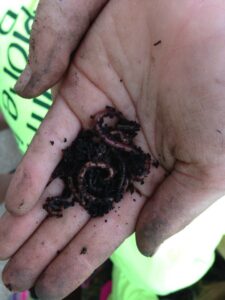2015 Annual Report for YENC15-094
The Big Garden Children - Youth Sustainable Agriculture Curriculum
Summary
This SARE grant would expand the following modules in our Grow-Your-Own Sustainable Agriculture Curriculum.
(1) Soil Health
Proposed Narrative: In the Soil Health lesson students will learn the function and importance of cover-crops, plant cover crop seed, develop a crop rotation plan, and determine which cover crops will be used in fall. Students will see how the cover crops improve their soil health by testing their soil at the beginning and end of the season. Students will learn about Vermicomposting and build their own worm farm.
Completed:
- Education Coordinator further developed Lesson One: I Love Dirt (file is attached).
- In Fall 2015 10 education gardens in Omaha were planted with cover crop, primarily oats, field peas, vetch and buckwheat.
- In Fall 2015 a free workshop on using cover crops in the garden was taught by a local farmer (Tyler Magnuson of Botna Burrow) in an education garden in Omaha. There were 10 participants.



- Cover crop seed (from Green Cover Seed in Nebraska) was made available for all Big Garden Nebraska & Southwest Iowa sites, and handed out to approximately 20 gardens.
- In February & April 2015 two free and open to the public Composting & Vermicomposting at Home workshops were taught.
- In May 2015 cover crop seed was turned into gardens. There was a notable difference in soil health at various sites that used cover crop (Completely Kids, Kellom Educare, South Omaha YMCA, J.C. Wade, Indian Hill Educare).

- In June 2016 we started the Grow-Your-Own Summer Garden Program on June 1st. Our first lesson I Love Soil was taught at 26 different education gardens the week of June 1st through June 8th reaching 600+ children and youth ages 2.5 to 18.
- In June 2016 we built 10 new vermicompost bins with help from some of our participants. These bins were given out to education gardens to use during the summer.
- In Fall 2016 all education gardens were planted out with cover crops.

(2) Permaculture
Proposed Narrative: In the Permaculture lesson students will learn about annuals and perennials and permaculture design. They will develop a space at the garden dedicated to edible perennials and native plants. Students will plant the milkweed in 2015 because of its important relationship with monarch butterflies, as well as other pollinators. We will also discuss Colony Collapse Disorder (CCD) and what steps can be taken at the garden to protect honeybees.
Completed:
- Education Coordinator expanded the activities and information in Permaculture Principles & Bugs & Bees lessons which emphasize native plants and pollinators.
- In Summer 2015 The Big Garden Interns introduced participants in the Grow-Your-Own Summer Program to local honey.
- In Summer 2016 The Big Garden Education Coordinator & Interns designed and installed 4 new herb spirals (The Hope Center, South Omaha YMCA, Fontanelle Elementary, Element Learning Center, and Completely Kids) and 6 new pollinator patches (The Hope Center, South Omaha YMCA, Completely Kids, Indian Hill Educare, Kellom Educare, and Fontanelle Elementary) at our education gardens.
(3) Seed Saving
Proposed Narrative: In the Seed Saving lesson students will learn about Common Soil (the Omaha Seed Library) and Seed Savers Exchange, the importance of saving seed, learn the terms heirloom and open-pollinated, and discuss problems associated with not being able to save our seed. Common Soil Seed Library will provide The Big Garden seeds to grow for the seed library. Each garden site will grow 6 tomato plants for the seed library as well as lettuce seed. Students will play a seed ID game, build their own seed screens, learn dry processing and wet processing, threshing and winnowing, and seed storing techniques.
Completed:
- In Spring 2015 Education Coordinator developed the Seed Saving lesson in the Grow-Your-Own curriculum.
- In Summer 2015 two education gardens participated in producing seeds to save at their garden, and 20 education gardens covered the seed saving lesson in the curriculum.
- In Spring 2016 The Big Garden participated in Common Soil Seed Share and donated seeds to the local seed library, Big Garden also held its own Seed Share with over 70 participants.
- In Summer 2016 seed processing screens were purchased for seed saving.
- In Fall 2016 three free open to the public workshops were taught at the Big Garden Campus on Seed Saving. We covered both wet and dry processing.
(4) Extending the Growing Season
Proposed Narrative: In the Extending the Growing Season lesson students will build their own low-hoops and cold frames. Cold-hearty annuals will be selected for planting in the cold frames in the fall.
Completed:
- In Fall 2015 one cold frame was built.
- In Fall 2016 Education Coordinator purchased row cover and hoops for season extension. This objective is not complete. Will be completed in Fall 2016.
(5) Farm to Table
Proposed Narrative: Farm to Table lesson students will discuss the importance of growing their own food and supporting local farmers through games and activities. They will meet a local farmer who will share the sustainable practices they use on their farm, discuss why they use these practices, and bring samples of products from their farm for students to try.
Completed:
- In Summer 2015 8 education gardens had visits from local farmers including (Old Tree Farm, New Earth Farm & Goods, Botna Burrow, Big Muddy Urban Farm, Heartland Organics, Doe's & Diva's Dairy).
- In Summer 2016 15 education gardens had visits from local farmers.
Proposed Project Timeline
1-1-15 – Finish rough draft of five new modules. (EPC denotes Education & Programming Coordinator)
COMPLETE (new curricula attached)
1-15-15 – Meeting with Soil Scientist Charles Shapiro to get feedback on the Soil Health module. Changes will be made to lesson plan.
COMPLETE/CHANGE - Gathered input from Nebraska Sustainable Ag and Practical Farmers of Iowa Conference.
1-30-15 – Weekend Intensive Training with Common Soil Seed Library on teaching Seed Saving Techniques. The Seed Saving module will be completed.
COMPLETE - Worked with Betsy Goodman founder of Common Soil Seed Library and developed Seed Saving lessons and plan for saving seeds at The Big Garden education gardens. Attending Seed Saving weekend workshop.
2-15-15 – Meeting with Big Muddy Urban Farm to design plan for Extending the Growing Season.
COMPLETE/CHANGE - Tyler Magnuson of Botna Burrow farm (instead of Big Muddy Urban Farm) assisted with the season extension planning.
3-15-15 – All lesson plans for 2015 “Grow Your Own” Curriculum will be completed.
COMPLETE
4-1-15 – All materials procured for new modules including; Vermicompost Bin, Designs for native plant spaces at each garden, Seed Screens, Seed Storage Containers, Flexible Hoops with Row Cover, and Cold Frames.
COMPLETE
Develop a plan for training summer Garden Teachers in these new modules during their week-long training in May.
COMPLETE
“Grow Your Own: A Sustainable Agriculture Curriculum for Children and Youth” will be printed and disbursed to all Big Garden sites.
COMPLETE
4-15-15 –Host spring “Garden Educator Meet-up” to share new materials and resources made possible by SARE Youth Educator grant.
COMPLETE
5-15-15 – Garden Teachers will be hired at The Big Garden for the summer and trained in the new modules. COMPLETE - Summer 2015 6 new interns were trained and implemented the Grow-Your-Own Curriculum and Summer 2016 7 new interns (and 2 year-round staff) were trained and implemented the Grow-Your-Own Curriculum
May 1st through May 15th – Local Farmers will be contacted and invited to be guest speakers at our gardens, schedule will be set for Farm To Table Lesson.
COMPLETE for Summer 2015
5-15-15 – 10-week curriculum begins at all garden sites.
COMPLETE
May 15th to August 15th – Garden Teachers will share their experiences at garden classes on Facebook and on the Big Garden Intern Blog.
COMPLETE - The intern blog can be found at www.thebiggarden.tumblr.com
8-15-15 – Students will work on season extension projects at their gardens. Seed saving module will begin.
COMPLETE
September and October 2015 – Fall cover-crops will be planted at the gardens.
COMPLETE
9-15-15 – Summer Programming Report completed.
COMPLETE